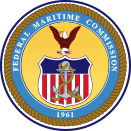Commissioner Carl W. Bentzel met with the Board of Directors of the Digital Container Shipping Association earlier this month in Europe to discuss a path forward for implementing international container maritime data standards in the United States trades. The discussion on how to finalize data standards is an outgrowth of the Maritime Transportation Data Initiative (MTDI).
“During the COVID-19 pandemic, the inefficiencies and challenges in global maritime supply chains became painfully clear. These inefficiencies cost trillions of dollars in higher shipping costs and delays which contributed to the high inflation US consumers are experiencing today. Shipping congestion was heavily impacted by a lack of meaningful and real-time exchange of the data necessary to ensure an efficient and economic transportation system,” said Bentzel.
One of the conclusions of the MTDI Summit held in June 2022, was that the data and the solutions to process it exist in abundance. A second conclusion was that numerous approaches exist for information related to maritime cargo operational movement, but few sources and definitions have been developed and vetted across stakeholder groups. Exceptions to this are the information collected by U.S. Customs and Border Protection, the information collected by the U.S. Coast Guard on vessel entries into U.S. water, and standards developed by DCSA.
“Throughout the initial MTDI meetings, it was emphasized that the FMC should not reinvent the wheel or impose requirements onto the industry which will not work in an international operational environment,” Commissioner Bentzel said. “DCSA’s standards fit these criteria and provide an excellent basis on which to develop our national standard for maritime data exchange. However, due to their voluntary nature, the adoption of those standards has been slow, too slow. Therefore, it might be a useful exercise to solicit feedback from the public on whether a rulemaking could be beneficial. I do not intend to set detailed requirements, but rather to harmonize existing information to be maximized to provide real-time information and to create guardrails ensuring it is properly conveyed to the shipping public,” Bentzel said.
As part of his trip to Europe, Commissioner Bentzel also met with his counterparts at the European Commission and with senior officials at the Port of Antwerp-Bruges and the Port of Rotterdam. “Europe is very advanced in data exchange for both maritime and inland transportation. Both ports are critical nodes servicing U.S. trade, and they have continually struggled to get better information, in order to maximize the efficient movement of intermodal container cargo.”.
“The final recommendations will be made available to the public after I have had the opportunity to meet with my fellow Commissioners for further discussion. All stakeholders will again have an opportunity to provide input,” said Bentzel.
Carl W. Bentzel is a Commissioner with the U.S. Federal Maritime Commission. The thoughts and comments expressed here are his own and do not necessarily represent the position of the Commission.

